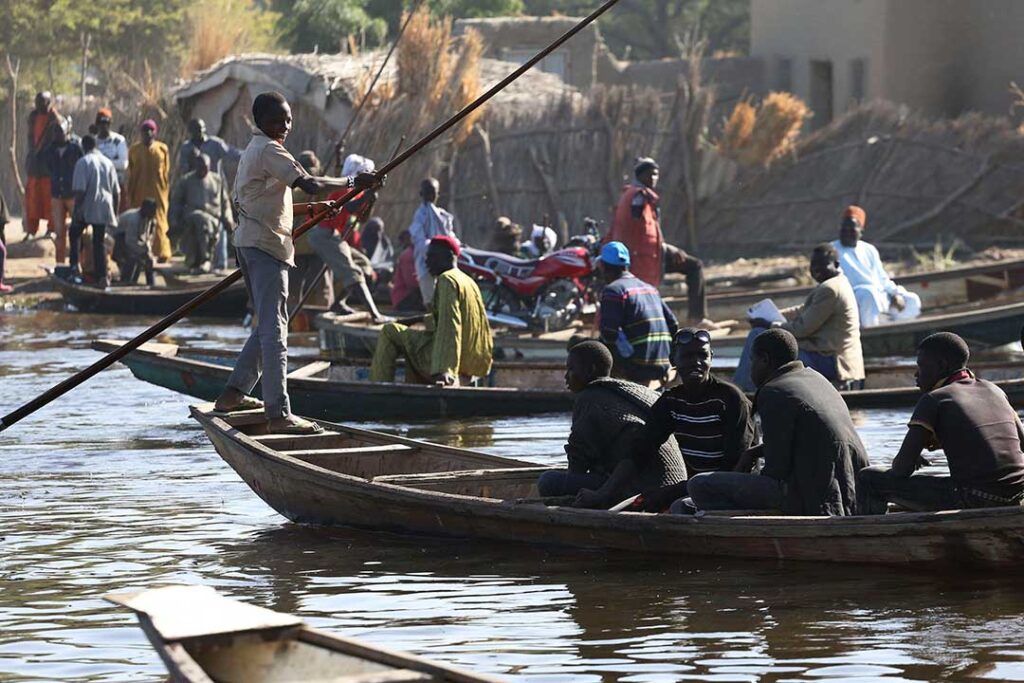ADF STAFF
Musa Barkame once made his living transporting goods by boat across Lake Chad to markets in Nigeria. All that ended when Boko Haram arrived in the region.
“Trading between here and Nigeria is the only job I know,” Barkame told Al-Jazeera while sitting in his waterlogged boat on the Chadian side of the lake.
The last time he used his boat, it was to rescue villagers from Boko Haram raids. Now, the boat sits idle, waiting for the day it will return to duty.
Like thousands of farmers, fishermen and cattle herders, Barkame is caught between two forces operating in the Lake Chad Basin (LCB): extremists such as Boko Haram and the government forces trying to drive them out.
The conflict has devastated the region’s once-vibrant economy, which saw trade flowing routinely among communities in Cameroon, Chad, Niger and Nigeria. Those caught in the middle have fewer options for maintaining their livelihoods. Some have even turned to the extremists for income.
Looting by extremists has robbed people of their property and livelihoods. Governments have complicated things by closing major trade routes and banning the transport of fish and other materials suspected of benefiting extremists.
A new report from the Institute for Security Studies (ISS) suggests that increasing government investment to rebuild the economy of the Lake Chad region eventually could defeat extremists by improving the lives of the region’s 22 million inhabitants.
The report echoes parts of the Regional Strategy for the Stabilization, Recovery and Resilience of Boko Haram-affected areas adopted in 2018 by the Lake Chad Basin Commission.
“The LCB was an area of intense production and flourishing economic activity before the conflict,” wrote the report’s authors, ISS researchers Teniola Tayo and Remadji Hoinathy. “Boko Haram has taken advantage of the contested presence of the state and the marginalization of communities to gain a foothold and generate revenue by taking over and controlling economic opportunities.”
Since Boko Haram and its offshoot, the Islamic State West African Province, set up operations in the Lake Chad Basin, the region has been shattered by violent attacks from extremists and by government restrictions instituted to try to undercut them.
Since the conflict began, the booming cross-border trade among Lake Chad Basin nations has plummeted by 70%, according to the ISS.
Nigeria, which is the hub of regional trade, has closed several major roads to the transportation of fish, grains and other foods. Forced to take alternative routes to markets, cattle herders now need 40 days for a trip that used to take 22. Their cattle often have lost weight by the time they reach their destination, reducing their value.
In place of the traditional economy has grown what Tayo and Hoinathy call the “NGO economy.” That economy is driven by international aid agencies that have set up shop in the region to help people displaced by the ongoing conflict. The NGO economy is not sustainable, according to the authors.
“To help communities resist and recover from the Boko Haram conflict, their lives and livelihoods must be protected,” Tayo and Hoinathy wrote.
People living around Lake Chad want governments to secure farms, markets and transport routes to revive the local economy. They also need low-cost or interest-free credit to help them regain their losses, according to the authors.
The region needs more government investment, both in the agricultural sector and in everyday security, Tayo and Hoinathy wrote. Doing that could put Boko Haram and other extremists on the back foot, they added.
“The continued absence of government support for restoration of livelihoods pushes communities to forge social contracts with violent extremists,” they wrote. “Thus, it is important to better secure communities and trade routes by developing more effective military engagement along with appropriate civil protection.”

